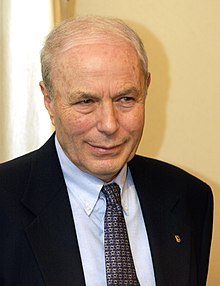Avram Hershko
Avram Hershko ( Hebrew אברהם הרשקו; * December 31, 1937 as Ferenc Herskó in Karcag , Hungary ) is a multi-award-winning Israeli biochemist and Nobel laureate in chemistry of Hungarian-Jewish origin. In 2004 he received the Nobel Prize in Chemistry .
Hershko and his family survived the Holocaust. His maternal grandparents disappeared in the Holocaust along with around 360,000 Hungarian Jews. Hershko emigrated from Hungary to Israel in 1950. In 1969 he received his PhD from Hadassah Medical School at the Hebrew University of Jerusalem . He is currently Professor at the Rappaport Family Institute for Research in Medical Sciences at the Technion (Israel Institute of Technology) in Haifa , Israel .
In the late 1970s and early 1980s, together with his doctoral students Aaron Ciechanover and Irwin Rose , he clarified the mechanism by which superfluous proteins are broken down in cells. These are marked with ubiquitin and broken down in the proteasomes .
He received the Israel Prize in 1994 , the Schleiden Medal in 1998 , a Gairdner Foundation International Award in 1999 , the Albert Lasker Award for Basic Medical Research and the Alfred P. Sloan, Jr. Prize in 2000, the Massry Prize and the Louisa in 2001 -Groß-Horwitz prize , 2002 EB Wilson Medal , and the 2004 Nobel prize in Chemistry for the discovery of ubiquitin -controlled protein - degeneration , along with Aaron Ciechanover and Irwin Rose . He has been a member of the National Academy of Sciences since 2003, of the American Philosophical Society since 2005 and of the American Academy of Arts and Sciences since 2007 .
literature
- Avram Hershko , in: Internationales Biographisches Archiv 01/2005 of January 8, 2005, in the Munzinger archive ( beginning of the article freely available)
Web links
- Information from the Nobel Foundation on the 2004 award ceremony for Avram Hershko
Individual evidence
- ↑ a b nobelprize.org: Avram Hershko - Autobiography
| personal data | |
|---|---|
| SURNAME | Hershko, Avram |
| ALTERNATIVE NAMES | Herskó, Ferenc (maiden name); אברהם הרשקו (Hebrew) |
| BRIEF DESCRIPTION | Israeli biochemist |
| DATE OF BIRTH | December 31, 1937 |
| PLACE OF BIRTH | Karcag , Hungary |
